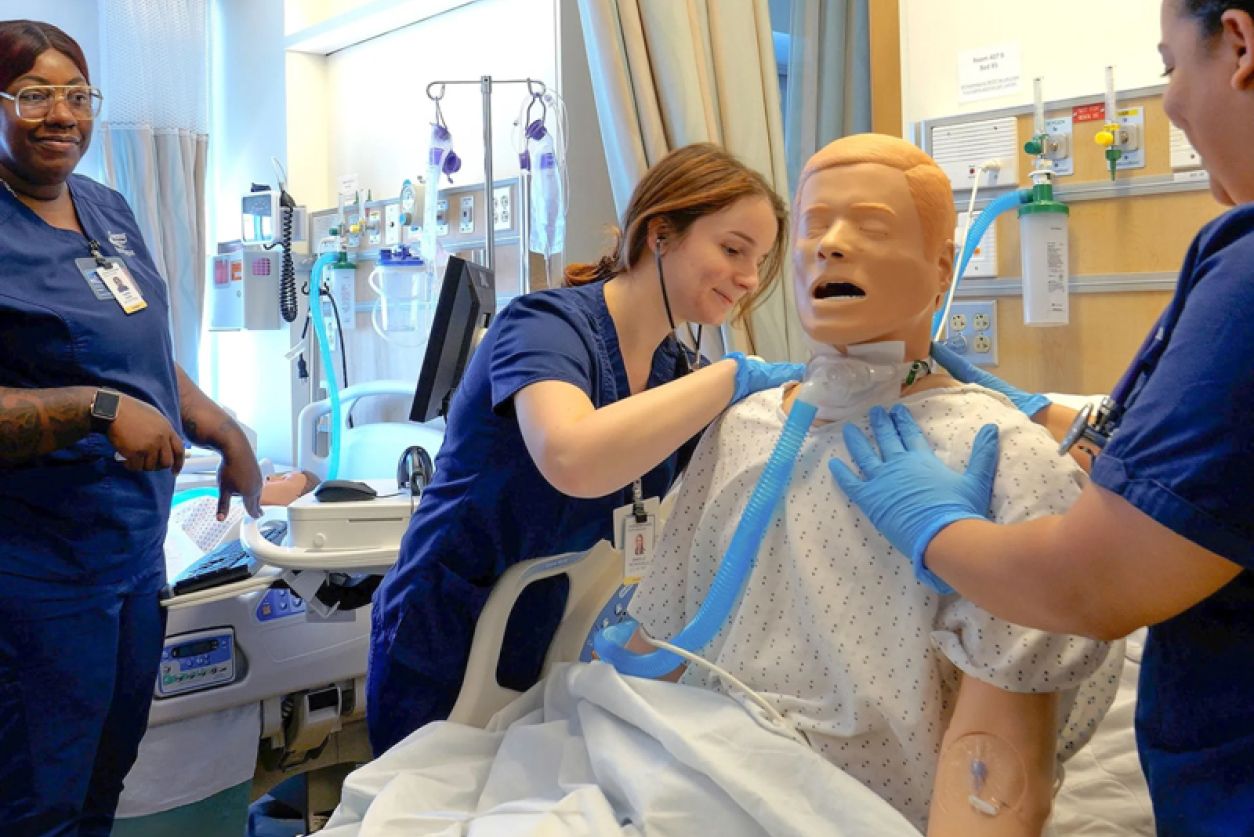Registered Nursing
COMMITMENT
MODE OF STUDY
CAMPUSES
CAREER FIELD(S)

Nurses work directly with patients to care for them in hospitals, doctor's offices, clinics and other healthcare facilities.
The registered nurse programs are located at 6 campuses in CT. The curriculum consists of 36-44 general education and 35 nursing course credits. Select prerequisite courses (up to 21 credits) must be completed prior to admission. Once admitted, the nursing program can be completed in 4 semesters of full-time study, leading to an Associate of Science degree. Graduates are eligible to apply for Registered Nurse Licensure.
Selective Admissions
Nursing is a selective admissions program. To be accepted, you must meet additional requirements beyond general acceptance to the college.
Curriculum
See learning outcomes and required courses for the Nursing program.
Nursing Program Resources
Contact Us
Questions about the admissions process for Nursing? Contact us at ctstate-selectiveadmissions@ct.edu
The program coordinators below can answer any questions you may have about a particular campus' program.
Capital (Hartford)
Kristen Guida
kristen.guida@ctstate.edu
Gateway (N. Haven)
Bien Tabuzo
bienvenido.tabuzo@ctstate.edu
Naugatuck Valley (Waterbury)
Lisa Silk
lisa.silk@ctstate.edu
Northwestern (Winsted)
Connie Hotchkiss
constance.hotchkiss@ctstate.edu
Norwalk
Ezechiel Dominique
ezechiel.dominique@ctstate.edu
Three Rivers (Norwich)
Cynthia Arpin
cynthia.arpin@ctstate.edu
The registered nursing curriculum is designed to align with local, regional, and national healthcare standards and trends. Throughout the program, you'll acquire hands-on experience with guidance from registered nurse faculty, working in state-of-the-art simulation labs and various clinical settings, equipping you to excel in a wide range of healthcare environments.

More than 90% of CT State registered nursing graduates secure employment in Connecticut within one year of graduation, earning an average starting salary of $73,352. They are well-prepared to begin their careers immediately or seamlessly transfer their credits into a bachelor’s degree program in nursing.
Partnerships with Healthcare Systems
The college collaborates with healthcare systems such as Hartford HealthCare, Yale New Haven Health, UConn Health, Nuvance Health, and the Veterans Health Administration to provide students with comprehensive training and exposure to real-world healthcare scenarios.
Opportunities for Current LPNs
CT State welcomes current LPNs to advance their education toward becoming registered nurses. Eligible LPNs must hold a current license to practice in Connecticut, meet all admission requirements and submit a nursing program application.

CT State believes in fostering greater gender diversity in the nursing program, with some campuses offering specific directives or support to men in their nursing programs.
Program Licensure, Accreditation and Outcomes
Program Accreditation and Approval
CT State Community College nursing programs are approved by the Connecticut State Board of Examiners for Nursing with the consent of the Commissioner of the Connecticut Department of Public Health.
The nursing programs of CT State Community College at the Capital, Three Rivers, Gateway, Norwalk, Northwestern, and Naugatuck Valley campuses that are located in Hartford, Norwich, New Haven, Norwalk, Winsted and Waterbury Connecticut are accredited by the Accreditation Commission for Education in Nursing, ACEN, 3390 Peachtree Road NE, SUITE 1400, Atlanta, GA 30326; Phone: 404-975-5000, Fax: 404-975-5020, Email: info@acenursing.org.
The most recent accreditation decision made by the ACEN Board of Commissioners for the six associate degree nursing programs is continuing accreditation.
Licensure Disclosure Statement
Connecticut State Community College nursing programs at the Capital, Gateway, Naugatuck Valley, Norwalk, Northwestern Connecticut and Three Rivers campuses meet the state education requirements for a Registered Nurse license in the state of Connecticut.
Connecticut State Community College has not determined if the associate of science degree, registered nurse program meets the state education requirements in any other state, any U.S. Territory, or the District of Columbia. Applicants should investigate licensure requirements prior to accepting an offer of admission to a nursing program.
The licensure boards in each state are responsible for establishing the requirements for licensure/certification for their state. Students who intend to seek licensure in any state other than Connecticut need to consult with the state professional licensing board. The state professional licensing boards make the decision on whether an individual is eligible for licensure based on the rules and regulations in place at the time the individual submits their application for licensure.
Websites for each State Regulatory Agency for Nursing can be found on the NCSBN Member Boards webpage.
Program Outcomes by Campus
Click on a campus name for pass rate, completion rate and job placement rate for each program.
CT State Capital Nursing Program Outcomes
NCLEX-RN® Licensure Examination Pass Rates Data
| Graduating Class of: |
NCLEX Pass Rate for CT State Capital |
|---|---|
| 2024 |
94.68% (90/95) |
| 2023 | 94.59% (105/111) |
| 2022 | 73.64% (81/110) |
Nursing Program Completion Rates for CT State Capital
| Graduating Class of: |
% of Cohort Completing CT State Capital Nursing Program |
|---|---|
| 2024 | 61% |
| 2023 | 60% |
| 2022 | 62% |
Job Placement Rates for CT State Capital
| Graduating Class of: |
% of Cohort Gaining Employment as a Registered Nurse Within One Year of Graduation |
|---|---|
| 2023 | 98% |
| 2022 | 96% |
| 2021 | 94% |
CT State Gateway Nursing Program Outcomes
NCLEX-RN® Licensure Examination Pass Rate Data
| Graduating Class of: |
NCLEX Pass Rate for CT State Gateway | National Mean |
|---|---|---|
| 2024 | 100% (82/82) | 91% |
| 2023 | 89% (70/79) | 89% |
| 2022 | 80% (67/84) | 80% |
*Average of first-time test-takers during the same 12-month period from May 1st through April 30.
+National average first time US educated candidates.
Nursing Program Completion Rates for CT State Gateway
| Graduating Class of: |
% of Cohort Completing CT State Gateway Nursing Program |
|---|---|
| 2024 | 65% (72/111) |
| 2023 | 63% (78/123) |
| 2022 | 70% (62/88) |
**Students who complete the program of study on time.
CT State Naugatuck Valley Nursing Program Outcomes
NCLEX-RN® Licensure Examination Pass Rate Data
| Graduating Class of: |
NCLEX Pass Rate for CT State Naugatuck Valley* | National Pass Rate + |
|---|---|---|
| 2024 | 97% (106/109) | 91% |
| 2023 | 96% (94/98) | 89% |
| 2022 | 76% (85/112) | 80% |
*Average of first-time test-takers during the same 12-month period from May 1st through April 30.
+National average first time US educated candidates.
Nursing Program Completion Rates for CT State Naugatuck Valley
| Graduating Class of: |
% of Cohort Completing CT State Naugatuck Valley Nursing Program** |
|---|---|
| 2025 | 66% (83/125) |
| 2024 | 68% (85/125) |
| 2023 | 72% (88/123) |
**Students who complete the program of study on-time.
CT State Northwestern Nursing Program Outcomes
NCCC RN Program Benchmark for NCLEX-RN® First Time Pass Rate:
| Graduating Class of: |
NCLEX Pass Rate for CT State Northwestern | National Pass Rate* |
|---|---|---|
| 2024 | 97% | 91% |
| 2023 | 97% | 89% |
| 2022 | 93% | 80% |
*National average first time US educated candidates
Nursing Program Completion Rates for CT State Northwestern
| Graduating Class of: |
% of Cohort Completing CT State Northwestern Nursing Program on time as defined by ACEN |
|---|---|
| 2025 | 91% (30/33) |
| 2024 | 94% (33/35) |
| 2023 | 88% (29/33) |
CT State Norwalk Nursing Program Outcomes
NCLEX-RN® Licensure Examination Pass Rates Data
| Graduating Class of: |
NCLEX Pass Rate for CT State Norwalk |
|---|---|
| 2025 | 93.22% |
| 2024 | 95% |
| 2023 | 80% |
Nursing Program Completion Rates for CT State Norwalk
| Graduating Class of: |
% of Cohort Completing CT State Norwalk Nursing Program |
|---|---|
| 2025 | 73% |
| 2024 | 54% |
| 2023 | 57% |
| 2022 | 67% |
Job Placement Rates for CT State Norwalk
| Graduating Class of: |
% of Cohort Gaining Employment as a Registered Nurse Within One Year of Graduation |
|---|---|
| 2025 | 95% |
| 2024 | 100% |
| 2023 | 96% |
| 2022 | 95% |
CT State Three Rivers Nursing Program Outcomes
NCLEX-RN® Licensure Examination Pass Rates Data
| Graduating Class of: |
NCLEX Pass Rate for CT State Three Rivers |
|---|---|
| 2024 | 100% (71/71) |
| 2023 | 93% (85/91) |
| 2022 | 94% (66/70) |
Nursing Program Completion Rates for CT State Three Rivers
| Graduating Class of: |
% of Cohort Completing CT State Three Rivers Nursing Program |
|---|---|
| 2022 | 59% (58/98) |
| 2021 | 65% (61/94) |
| 2020 | 58% (56/96) |
Job Placement Rates for CT State Three Rivers
| Graduating Class of: |
% of Cohort Gaining Employment as a Registered Nurse Within One Year of Graduation |
|---|---|
| 2022 | 100% (57/80 responses returned) |
| 2021 | 100% (45/61 responses returned) |
| 2020 | 100% (54/84 responses returned) |